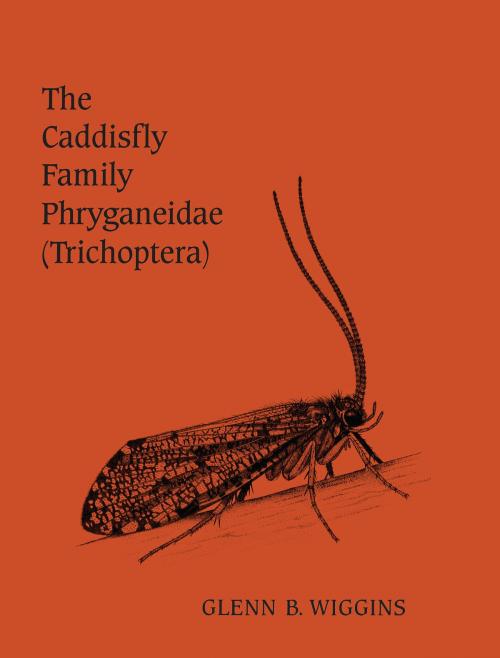The Caddisfly Family Phryganeidae (Trichoptera)
Nonfiction, Science & Nature, Science, Biological Sciences, Entomology, Nature, Insects & Spiders, Earth Sciences| Author: | Glenn B. Wiggins | ISBN: | 9781442656192 |
| Publisher: | University of Toronto Press, Scholarly Publishing Division | Publication: | December 15, 1998 |
| Imprint: | Language: | English |
| Author: | Glenn B. Wiggins |
| ISBN: | 9781442656192 |
| Publisher: | University of Toronto Press, Scholarly Publishing Division |
| Publication: | December 15, 1998 |
| Imprint: | |
| Language: | English |
The goal of much of the scientific work in natural history museums is to explore and document the biological diversity of the planet. This book is an outstanding example of the museum tradition, offering the results of global research on the biosystematics of one of the families of case-making caddisflies, the Phryganeidae. Throughout his career as a museum curator, Glenn Wiggins has studied and written extensively on caddisflies of the aquatic insect order Trichoptera.
Information acquired from field work and museum collections, and from the biological literature is synthesized into a taxonomic monograph. The Phryganeidae are the largest of all the caddisflies, but existing literature has led to problems in species identification, especially in Asia; nine species names were found to be synonyms of others, an unsually high proportion of 10 per cent of the described species. Fifteen genera comprising seventy-four species are recognized here, including three that are new to science. Generic keys are provided for adults, larvae, and pupae; keys to species are given for adults. Morphological structures used in the keys are fully illustrated in 246 line drawings and half-tone plates. Distribution maps are provided for most of the North American species.
Hypotheses are inferred for the phylogeny of the genera, and for the species in each genus; the fossil history of the Phryganeidae is reviewed. From this base, the biogeography of the family is interpreted. Of evolutionary interest is an extraordinary relationship between larval case-making and pupation behaviour and the degradation of functional pupal mandibles. Contrasting colour patterns of the wings in some species of the Phryganeidae are interpreted for the first time in the Trichoptera as part of a protective warning system to deter predators. Variation in genitalic morphology far exceeding normal species limits is documented in two species, and the evolutionary implications are considered. Combined with fossil evidence that the Phryganeidae are the oldest of the case-making Trichoptera still extant, several of the atypical morphological and behavioural attributes discussed in this book can be interpreted as plesiomorphic, placing the Phryganeidae in a pivotal position for inferring phylogeny in the Trichoptera. A revised classification embodying much new information is proposed for the family Phryganeidae.
The taxonomy, biology, and evolution of no other family of caddisflies has been treated as extensively.
The goal of much of the scientific work in natural history museums is to explore and document the biological diversity of the planet. This book is an outstanding example of the museum tradition, offering the results of global research on the biosystematics of one of the families of case-making caddisflies, the Phryganeidae. Throughout his career as a museum curator, Glenn Wiggins has studied and written extensively on caddisflies of the aquatic insect order Trichoptera.
Information acquired from field work and museum collections, and from the biological literature is synthesized into a taxonomic monograph. The Phryganeidae are the largest of all the caddisflies, but existing literature has led to problems in species identification, especially in Asia; nine species names were found to be synonyms of others, an unsually high proportion of 10 per cent of the described species. Fifteen genera comprising seventy-four species are recognized here, including three that are new to science. Generic keys are provided for adults, larvae, and pupae; keys to species are given for adults. Morphological structures used in the keys are fully illustrated in 246 line drawings and half-tone plates. Distribution maps are provided for most of the North American species.
Hypotheses are inferred for the phylogeny of the genera, and for the species in each genus; the fossil history of the Phryganeidae is reviewed. From this base, the biogeography of the family is interpreted. Of evolutionary interest is an extraordinary relationship between larval case-making and pupation behaviour and the degradation of functional pupal mandibles. Contrasting colour patterns of the wings in some species of the Phryganeidae are interpreted for the first time in the Trichoptera as part of a protective warning system to deter predators. Variation in genitalic morphology far exceeding normal species limits is documented in two species, and the evolutionary implications are considered. Combined with fossil evidence that the Phryganeidae are the oldest of the case-making Trichoptera still extant, several of the atypical morphological and behavioural attributes discussed in this book can be interpreted as plesiomorphic, placing the Phryganeidae in a pivotal position for inferring phylogeny in the Trichoptera. A revised classification embodying much new information is proposed for the family Phryganeidae.
The taxonomy, biology, and evolution of no other family of caddisflies has been treated as extensively.















